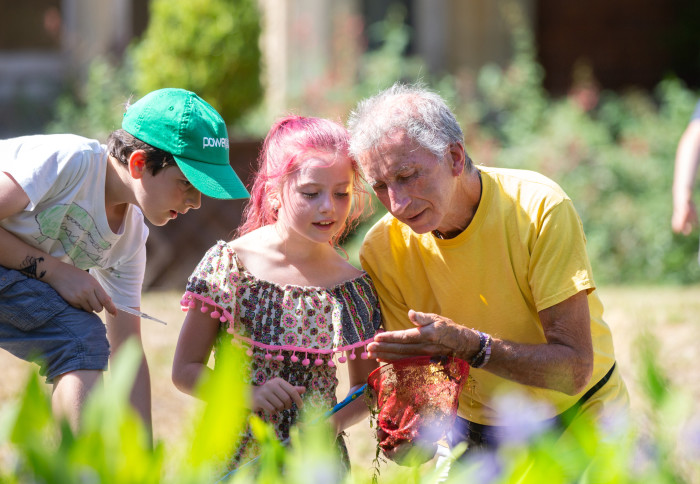Citizen Science Masterclass explores ways the public can be part of research

Members of staff joined Imperial’s first ever Citizen Science Masterclass with guest speakers from Zooniverse, nQuire and OPAL.
On Tuesday 15 September, The Societal Engagement team ran Imperial’s first Masterclass in Citizen Science. The training session was an opportunity for researchers at the College to learn about citizen science as an approach to engaging the public with research.
What is Citizen Science?
Hosted by Liz Danner and James Romero of the Public Engagement team, the session opened with an introduction to citizen science followed by a series of examples.
"[It’s about] how we can bring the general public into the conversation to either formulate research questions or help us go out and find information." Liz Danner Public Engagement team
Danner explained that citizen science can take on many forms: the public might be forming research questions, they might be gathering data or they might be analysing it – it’s all citizen science.
Danner drew on examples including Imperial’s Open Air Laboratories (OPAL) project. OPAL saw over one million members of the public submit information to researchers about their local environments, supplying valuable data on environmental degradation, loss of biodiversity and climate change. The Parenting Science Gang was another example with an Imperial link that illustrated the breadth of possibilities within citizen science. Described as “radically citizen-led”, this project entailed a group of parents who came together on Facebook with a range of parenting questions that they wanted to answer through science. Questions related to reusable nappies, the role of healthcare professionals in supporting breastfeeding and much more. The project is now funded by Wellcome.
Tips from an expert panel
The expert panel included:
- Thea Herodotou - Academic lead of nQuire at the Open University, a citizen science platform developed with the BBC.
- Grant Miller - Communications and Projects Manager at Zooniverse, a citizen science web portal.
- Laurence Evans - Evaluation and Data Manager at OPAL.
- Poppy Fraser Lakeman - Citizen Science Manager for X-Polli:Nation, a National Geographic funded collaboration working with school students, AI technologists and ecologists. Lakeman also worked at OPAL and helped set up the European Citizen Science Association (ECSA).
Panellists shared case studies, giving an overview of the platforms and projects they work on, sharing with attendees some key considerations for any citizen science project as well as motivations to get involved in citizen science.
“Citizen science impacts how [researchers] approach their work and is a chance to give back to the community. Many become more passionate about their work.” Masterclass panellist
"There are lots of benefits to scientists," Herodotou said. "Many changed their attitudes to science and became more positive about their work."
Miller elaborated on the benefits to the scientific community, sharing insights into the start of Zooniverse. It initially set out to enable researchers to do science that they wouldn’t be able to do alone. These include projects that require thousands of hours of simple data analysis but could be spread across thousands of citizen science volunteers.
The project that kickstarted Zooniverse, for example, entailed millions of galaxy images that needed sorting by shape. The researchers uploaded the images to what is now Zooniverse. "They thought they would get a few hundred interested amateur astronomers," Miller explained, "but in the end, they got over 100,000 people around the world taking part and helping out."
Miller and his team soon realised that there was a far greater appetite than they had expected amongst the public to get involved in research in this way. This quickly led to conversations around ensuring volunteers have a meaningful and valuable experience, so they are encouraged to come back again and again. This includes thanking them and sharing any end results of the research they’ve been involved in.
Other key points raised by the panel include:
- The value of pre-existing resources and software to help teams facilitate their projects rather than then having to start from scratch. Zooniverse is a great platform that researchers can easily add their projects to without any software development required.
- The importance of teams considering the citizen’s experience in the project - particularly when working with underrepresented groups in science for whom it might be their first experience of working with scientists.
- The flexibility of citizen science projects in terms of scale. Projects don’t have to be used for mass public-wide projects. They could be used to continue a classroom engagement with a school group, for example, giving pupils a chance to collect or analyse their own data.
Following the panel discussion, attendees joined virtual break-out rooms where they could discuss practical aspects of citizen science projects such as volunteer recruitment and accessing funding.
"What stood out to me was the fact that citizen science enables you to do things in your research that wouldn’t otherwise be possible." Masterclass attendee
Speaking about the Masterclass, one attendee said, “I think what stood out to me was the fact that citizen science enables you to do things in your research that wouldn’t otherwise be possible. Someone mentioned reaching areas that are not usually accessible (e.g. people’s gardens) or enabling you to collect more/different data or ask different questions you hadn’t even considered before.”
Anyone interested in getting involved in citizen science is encouraged to get in touch with the public engagement team.
Further reading: Characteristics of citizen science from ECSA
Article text (excluding photos or graphics) © Imperial College London.
Photos and graphics subject to third party copyright used with permission or © Imperial College London.
Reporter
Ellie Cawthera
Communications Division